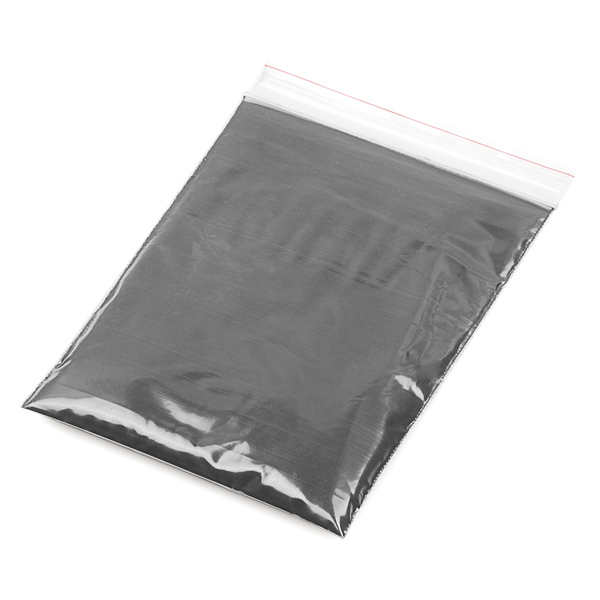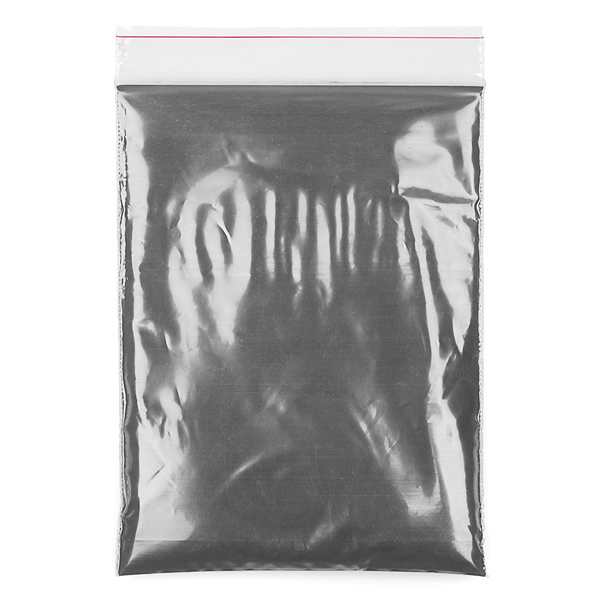Thermochromatic Pigment - Black (20g)
We've all seen toys and things that change color when you run them under warm water or heat them up in the sun. Some of us were especially mesmerized and had to find out what made them do that. It turns out that this is a property called "thermochromism" and it can be implemented in a number of ways. This particular pigment is a Leuco dye type pigment which is made up of a mixture of Leuco dyes, weak acids and salts microencapsulated in polymer. Sounds complicated, right? Nah, it's not so bad.
All you need to know is that this is a very fine, colored powder that changes to a clear powder when you heat it to about 92°F (33°C). This is really cool for a lot of reasons. You can mix this pigment with paint to create thermochromatic paint for craft projects or to make temperature indicators. It mixes with Sugru and Polymorph as well, rendering them both thermochromatic. Use a controllable electric heating source and you could even build a thermochromatic display!
This pigment comes in a 20g bag, which is more than enough to play with and just enough for a good sized project (depending on what you're doing with it). Careful not to overheat the pigment as temperatures over 200°C can cause irreversible damage to most Leuco dyes.
- Black at Room Temperature
- Turns Clear at Around 92°F (33°C)
- Mix with paint, glue, resin, Polymorph, Sugru, etc.
Thermochromatic Pigment - Black (20g) Product Help and Resources
21st Century Fashion Kit: Electrochromatic Circuits
November 5, 2014
Diana Eng walks you through a magically appearing design made with an thermochromatic pigment.
Electronic E-craft Terrarium
January 21, 2016
A guest tutorial on an Electronic Terrarium from the Performative Sculpture class of Parsons DT.
Core Skill: DIY
Whether it's for assembling a kit, hacking an enclosure, or creating your own parts; the DIY skill is all about knowing how to use tools and the techniques associated with them.
Skill Level: Noob - Basic assembly is required. You may need to provide your own basic tools like a screwdriver, hammer or scissors. Power tools or custom parts are not required. Instructions will be included and easy to follow. Sewing may be required, but only with included patterns.
See all skill levels
Comments
Looking for answers to technical questions?
We welcome your comments and suggestions below. However, if you are looking for solutions to technical questions please see our Technical Assistance page.
Customer Reviews
4 out of 5
Based on 4 ratings:
1 of 1 found this helpful:
Worked perfectly and super fast international shipping
Needed it for a Rorschach mask for a 21st party. It worked great for that and there were many impressed party goers.
In terms of shipping I ordered on a Monday arvo (New Zealand) so Sunday in the USA. Used FedEx express, half the price of usps express and more reliable. It arrived 3 days later on the Thursday (NZ time) just in time for the party the next night. Would definitely order from here again. Thanks.
Spotty Quality
The pigment was littered with tiny white flakes. The same was true for the red and the blue pigments. The flakes didn't mix well with the acrylic medium, resulting in a textured paint finish. The thermochromism still worked, but I found the quality of the paint to be somewhat disappointing. Canadian customers: be aware that you will have to pay import duty (I paid $90 on my $580 order)



is it possible to get more information about what exactly the thermochromic powder is made from? the datasheet says: CHEMICAL NATURE: Dye microencapsulated with polymer but nothing more specific.
in comparison, here the datasheet of another brand of thermochromic pigment, that lists it contains formaldehyde: https://findmydata.cloud/uploads/pdf/sfxc-free-flowing-powder-tds1.pdf
-------------------- Tech Support Tips/Troubleshooting/Common Issues --------------------
Look here for more tips on using thermochromatic pigment => [ https://www.sparkfun.com/products/11555#comment-58ec012ef3b1a81f3a8b4567 ].
I successfully mixed this stuff with a clear powder coat. The stuff I used cures at 340F for 20min, which was not enough to damage the dyes (most powder coat cures at 375-400F, which is probably too high). The only issues I had was it shot a little bit clumpy (next time I will run it through a fine mesh sifter first) and the flow out developed a heavy orange peel texture instead of smooth gloss.
I'm using it on an aluminum heated bed for a 3D printer, so we'll see how well it holds up to long term exposure to 60-100C temps....
Update: after months and hundreds of prints, the dye is starting to lose its morph. The center area of my bed, directly above the heating element, has become stuck in the "hot" state. However, the rest of the bed continues to work fine. I attribute this to the heating element getting only the center too hot and the heat not being even ( I often crank the bed up to over 100'C and my heating element does not cover the whole underside of the bed). I expect a more distributed heater, like a PCB reprap heater, would not have this issue and the dye would work well long term.
I saw a video about a DIY Rorschach mask made with this stuff. http://www.youtube.com/watch?v=tWWLn7vt37U
We gave it a try, just to make sure, and this stuff will DEFINITELY change color when you breathe through it! :)
Any idea on how long does it last under direct sunlight? (i mean, the UV are nasty and easily destroy most resins in no time, and i don't even want to know what they do to the dye itself)
Would it be possibly to mix this with water and then run a current through the solution to create the same color changing effect?
The pigment changes even just holding it in the bag, so I imagine this would work. Let us know how it goes though if you try it out!
Could i use this to dye the polymorph I got here? ;) edit: I read the description and it says polymorph :P sorry.